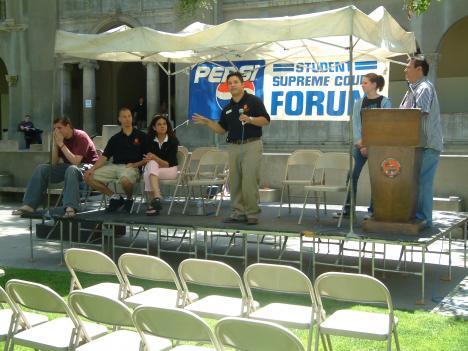By Vanessa Overbeck

SENATE FORUM
By Vanessa Overbeck
After less than 1 percent of Riverside Community College students voted for a student trustee, they gathered again to prepare for the Student Senate elections … or did they?
On April 21the Associated Students of RCC hosted the Student Senate Forum where candidates answered questions and presented their platforms. Of the 12 candidates only five attended the forum. But there was food.
In honor of the event ASRCC barbequed carne asada and served soft tacos. The line for the free food ran 30 people at its longest, while the chairs in front of the podium remained largely empty.
Behind the Earth Week recycling display in the A.G. Paul Quadrangle some of the candidates answered questions about low voter turnout, the most important issues facing students and their role as senate members. Ashley Di Muccio and Mike Gasca are running for president and vice president against Aunnie Ganier and Jenn Dewar. Andrew Cataldo, Gabriela Carbone, Drek Leimel, David Cooke, Aubrey Magill, Kenneth Ross, Kyle Kaiser, Jessica Guerrero, Jordan Wright and Alma Mendez are seeking Senate positions.
Gasca spoke on behalf of himself and his absent presidential candidate, Di Muccio. Ganier answeredquestions for both herself and her running mate Dewar.
The only Senate candidates to attend the forum included Cooke, Kaiser and Mendez
Ganier said students will respond with votes at the polls if they see proof of the Senate’s hard work, such as Juice Tuesdays and Earth Week. “Student apathy will disintegrate if students know the Senate works hard to improve the campus atmosphere,” Ganier said.
But Gasca said free meals are a meager way to cushion students’ wallets in these days of rising gas prices.
“Student Government needs to break from giving away free juice and hot dogs and address the real issues,” Gasca said.
Gasca stated the way to counter low voter turnout is to give students a reason to vote by giving them a candidate who fights for issues that matter.
He promised to protect students from fee increases to the cost of high textbooks to discrimination.
Gasca proposed to use his term in office to establish a book swap on campus where students could directly exchange texts.
“I want to make sure that students are protected so that their educational experience is a positive one,” Gasca said.
And Senate Candidate David Cook hopes to boost moral, though he had no specific plan of action. In fact, Cook wandered off the stage midway through the forum in order to serve food to waiting students.
However, there are only ten competitors for nearly 20 positions and the food did need serving.
Ganier boasted no specific goals for her term in office, but she did say she wants “to be the reflection of the student body.”
Gasca may not have the experience his competition has, but he does not see this as a weakness. Rather, he sees his leadership abilities as tied to his “go getter” attitude.
“I don’t have the experience the other candidates have, but leadership comes from action, not position,” Gasca said.
RCC students will have another chance to participate in the voting process April 26, 27 and 28. Students can log onto WebAdvisor and vote for the president and vice president of the Riverside Campus from their homes, the Digital Library or anywhere there’s a computer with Internet access.
However, this added convenience has created a controversy among Student Senate members.
In the days of paper ballots, Gasca understood that candidates could not campaign within 50 feet of voting booths.
This prevented candidates from unduly influencing voters. This rule still stands and actually reads that “campaigning is not allowed during voting dates” at all.
But the next line is contradictory and suggests that campaigning is just not allowed within the designated voting areas during the election.
But computers will replace voting booths on the election days. And with the wireless Internet any and all computers on campus become potential voting areas; hence, the restrictions on campaigning while students are voting.
With voter turnout at its lowest, this leaves highly populated areas, such as the A. G. Paul Quadrangle, absent of campaign cries and information announcing the important campus event.
The Associated Students of RCC set up a couple of laptops in a corner of the Quad for the event. Gasca is taking the rules literally and considers these the voting booths.
He is campaigning on campus but remaining 50 feet away from the established voting area, even though the final line of the campaign regulations reads: “there will be no campaigning during voting dates.”
But the competition is observing the rule. Friends of Ganier made shirts to support their candidate’s campaign, but they refrained from wearing them on election days.
“If I had my way there’d be campaigning on campus. But the campaign rules are clear,” Ganier said.
The candidates concluded the weakly attended forum by encouraging their fellow students to make their voices heard by casting their votes. Candidate Ganier encouraged students to bring the passion they have for life to their educations.
“Your life and your education go hand in hand. You’re not apathetic about your life, so get involved in your education. Vote,” Ganier said.
Senate candidate Alma knows it’s easiest to lazily avoid spending a few minutes on the RCC Web site, but she hopes students will take a higher road this election.
“Don’t do what’s easy, do what’s right,” Alma said.
In any case, low voter turnout or not, the results of the Senate election will be announced on April 29.






